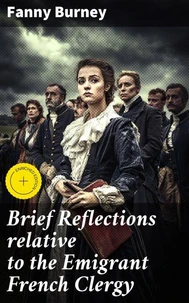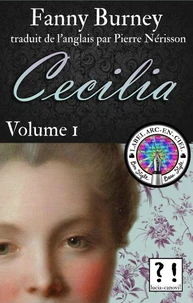Evelina, Or, the History of a Young Lady's Entrance into the World. A Young Lady's Journey Through 18th Century English Society
Par :Formats :
Disponible dans votre compte client Decitre ou Furet du Nord dès validation de votre commande. Le format ePub est :
- Compatible avec une lecture sur My Vivlio (smartphone, tablette, ordinateur)
- Compatible avec une lecture sur liseuses Vivlio
- Pour les liseuses autres que Vivlio, vous devez utiliser le logiciel Adobe Digital Edition. Non compatible avec la lecture sur les liseuses Kindle, Remarkable et Sony
 , qui est-ce ?
, qui est-ce ?Notre partenaire de plateforme de lecture numérique où vous retrouverez l'ensemble de vos ebooks gratuitement
Pour en savoir plus sur nos ebooks, consultez notre aide en ligne ici
- Nombre de pages411
- FormatePub
- ISBN4057664184535
- EAN4057664184535
- Date de parution20/11/2019
- Protection num.Digital Watermarking
- Taille733 Ko
- Infos supplémentairesepub
- ÉditeurGOOD PRESS
Résumé
In 'Evelina, Or, the History of a Young Lady's Entrance into the World, ' Fanny Burney crafts a compelling epistolary novel that intricately explores the trials and tribulations of a young woman's debut into society. Set in the late 18th century, the narrative unfolds through the protagonist's letters, capturing the nuances of social conventions, gender dynamics, and the quest for identity within the rigid class structures of her time.
Burney's wit and keen observation of societal norms not only provide a vivid portrait of the era but also establish her work as a precursor to the modern novel. Fanny Burney, born in 1752 to a literary family, drew inspiration from her rich cultural milieu and her own experiences navigating the complexities of social life. As a prominent figure in the literary community, she witnessed both the glitter and gloom of the upper classes, which informed her portrayal of Evelina's challenges, particularly in the realms of romance and reputation.
Burney's correspondence with influential figures, including Samuel Johnson and Madame de Sta?´l, further illustrates her immersion in the literary conversation of her time. 'Evelina' is a must-read for those interested in early feminist literature and the evolution of the novel as a form. Burney's intelligent satire and emotional depth resonate with contemporary audiences, making Evelina's journey both relatable and thought-provoking.
This work not only illuminates the constraints placed upon women in the 18th century but also celebrates their resilience and capacity for self-determination.
Burney's wit and keen observation of societal norms not only provide a vivid portrait of the era but also establish her work as a precursor to the modern novel. Fanny Burney, born in 1752 to a literary family, drew inspiration from her rich cultural milieu and her own experiences navigating the complexities of social life. As a prominent figure in the literary community, she witnessed both the glitter and gloom of the upper classes, which informed her portrayal of Evelina's challenges, particularly in the realms of romance and reputation.
Burney's correspondence with influential figures, including Samuel Johnson and Madame de Sta?´l, further illustrates her immersion in the literary conversation of her time. 'Evelina' is a must-read for those interested in early feminist literature and the evolution of the novel as a form. Burney's intelligent satire and emotional depth resonate with contemporary audiences, making Evelina's journey both relatable and thought-provoking.
This work not only illuminates the constraints placed upon women in the 18th century but also celebrates their resilience and capacity for self-determination.
In 'Evelina, Or, the History of a Young Lady's Entrance into the World, ' Fanny Burney crafts a compelling epistolary novel that intricately explores the trials and tribulations of a young woman's debut into society. Set in the late 18th century, the narrative unfolds through the protagonist's letters, capturing the nuances of social conventions, gender dynamics, and the quest for identity within the rigid class structures of her time.
Burney's wit and keen observation of societal norms not only provide a vivid portrait of the era but also establish her work as a precursor to the modern novel. Fanny Burney, born in 1752 to a literary family, drew inspiration from her rich cultural milieu and her own experiences navigating the complexities of social life. As a prominent figure in the literary community, she witnessed both the glitter and gloom of the upper classes, which informed her portrayal of Evelina's challenges, particularly in the realms of romance and reputation.
Burney's correspondence with influential figures, including Samuel Johnson and Madame de Sta?´l, further illustrates her immersion in the literary conversation of her time. 'Evelina' is a must-read for those interested in early feminist literature and the evolution of the novel as a form. Burney's intelligent satire and emotional depth resonate with contemporary audiences, making Evelina's journey both relatable and thought-provoking.
This work not only illuminates the constraints placed upon women in the 18th century but also celebrates their resilience and capacity for self-determination.
Burney's wit and keen observation of societal norms not only provide a vivid portrait of the era but also establish her work as a precursor to the modern novel. Fanny Burney, born in 1752 to a literary family, drew inspiration from her rich cultural milieu and her own experiences navigating the complexities of social life. As a prominent figure in the literary community, she witnessed both the glitter and gloom of the upper classes, which informed her portrayal of Evelina's challenges, particularly in the realms of romance and reputation.
Burney's correspondence with influential figures, including Samuel Johnson and Madame de Sta?´l, further illustrates her immersion in the literary conversation of her time. 'Evelina' is a must-read for those interested in early feminist literature and the evolution of the novel as a form. Burney's intelligent satire and emotional depth resonate with contemporary audiences, making Evelina's journey both relatable and thought-provoking.
This work not only illuminates the constraints placed upon women in the 18th century but also celebrates their resilience and capacity for self-determination.




